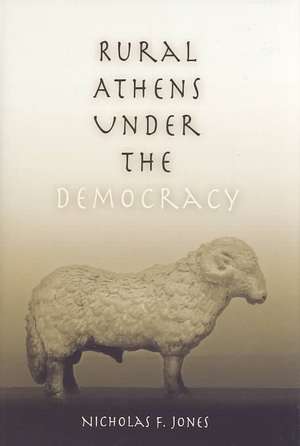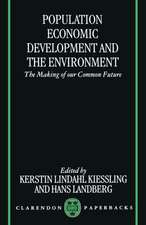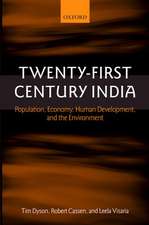Rural Athens Under the Democracy
Autor Nicholas F. Jonesen Limba Engleză Hardback – 16 feb 2004
Preț: 447.55 lei
Preț vechi: 502.87 lei
-11% Nou
85.64€ • 89.64$ • 71.28£
Carte tipărită la comandă
Livrare economică 31 martie-14 aprilie
Specificații
ISBN-10: 0812237749
Pagini: 344
Dimensiuni: 185 x 236 x 27 mm
Greutate: 0.65 kg
Ediția:New.
Editura: MT – University of Pennsylvania Press
Locul publicării:United States
Notă biografică
Cuprins
Preface
Figure
Abbreviations
Introduction
An Epistemological Problem. Terminology and Design of the Study. Ancient Sources. Scholarly Literature and Overview of Argument. Town vs. Country.
Chapter 1 Settlement
State and Rural Community. Determinants of Rural Residence Patterns. Epigraphic Evidence for Farmstead Residence. Literary Evidence for Rural Residence. The Nucleated Village Center.
Chapter 2 Society
The Attic Rural Family. Philotimia and Rivalry. Patronage: Customary Usage and Institutional Form. Communal Activity in the Deme-Association Center. Conclusion.
Chapter 3 Village
Acharnai. Aixone. Halai Aixonides. Teithras. Three Models.
Chapter 4 Dionysia
Name and Orientation of the Festival. Distribution of the Festival over the Demes. The Events of the Festival and Their Sequence. The Dionysiac Festival beyond the Deme. Conclusions.
Chapter 5 Realities
Settlement, Residence, and Mobility. Patronage: Big Man, Crisis, and Reciprocation. Agricultural Labor: Family, Class, and Gender. Hesiod, the Seasons, and Seasonality. Diet. Clothing. Music. Speech, Orality, and Literacy. Religion: Myth, Cult, and the Town. Mentalité.
Chapter 6 Images
Old Comedy and Aristophanes. Xenophon. Theophrastos of Eresos. Middle Comedy. New Comedy and Menander.
Chapter 7 Philosophy
Reign of Kronos, Hippodamos of Miletos, and Phaleas of Chalkedon. Plato: Deme, Place of Residence, and Urban Outlook. Plato's Social Topography: Rural Spaces and Society in the Republic, Kritias, and Laws, Book 3. The Cretan City in Plato's Laws. Aristotle.
Chapter 8 Paradigms
Bibliography
Subject Index















